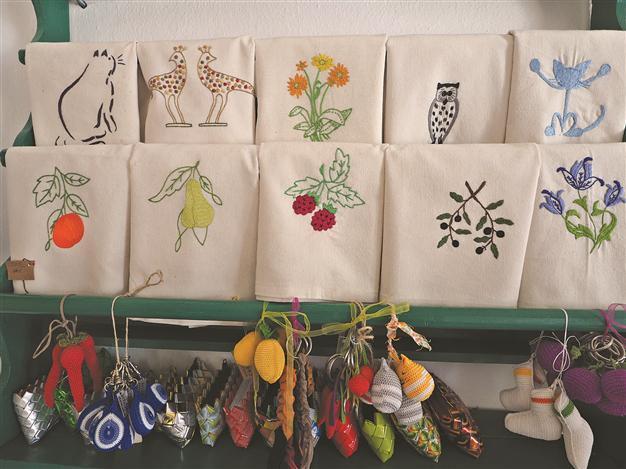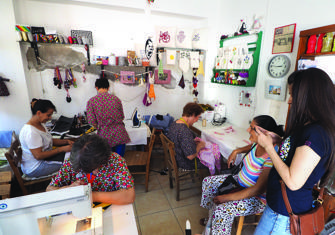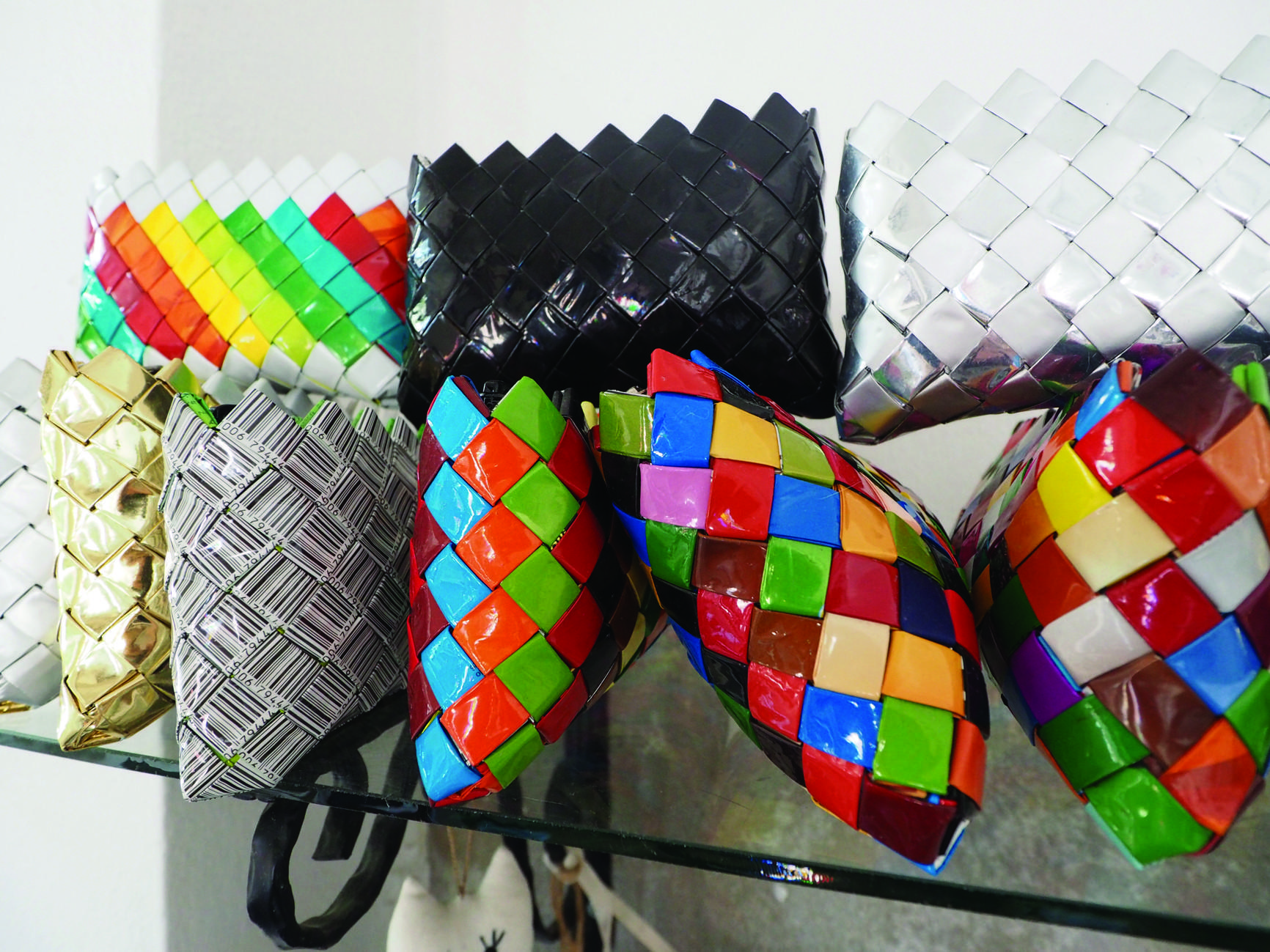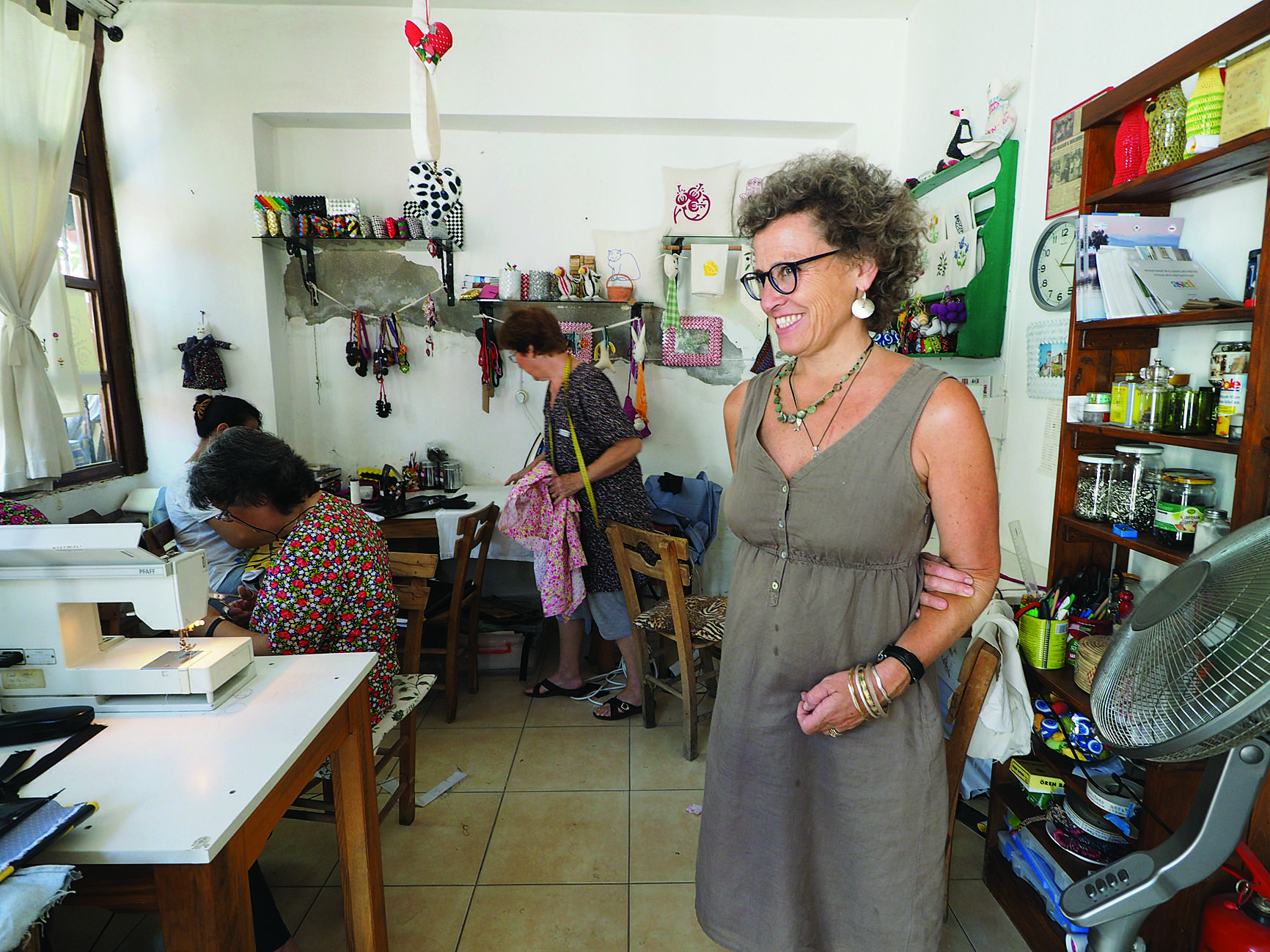Ayvalık ‘garbage ladies’ reaping what they sew
WILCO VAN HERPEN

Tara Hopkins started a project called ‘çöp madam’ six years ago to do something for Turkish women who have never had any job or earned any money. She is now working in her own workshop with other women.
Last week I might have been a bit negative about this cute little Rum place, so here is a positive story about Ayvalık. I have to admit, being a “public” figure helped me a lot to get a different impression of Ayvalık but I am sure that, if you approach the people with the same openness as I always do, you will have a wonderful stroll through Ayvalık. Having traveled intensively through Turkey for the last eight years, I cannot remember another place with so many houses built by the Turkish Rum minority that are still inhabited. Of course there are a lot of Rum villages in Turkey but most of those villages are either completely owned by their original inhabitants or the houses were taken over by Turkish citizens who later left the village after which the houses slowly started to decay due to the lack of maintenance. Recently some Turkish and foreign people started buying those houses and restoring them, but it is often not enough to save the character of the village. Here in Ayvalık you can see a transition period: the old, and often poor, local people selling their property and the new, richer, people buying them. Then restoration starts and the landscape of Ayvalık slowly begins to change. Old neglected houses next to newly restored houses give a special feeling to this unique Aegean town.
Having traveled intensively through Turkey for the last eight years, I cannot remember another place with so many houses built by the Turkish Rum minority that are still inhabited. Of course there are a lot of Rum villages in Turkey but most of those villages are either completely owned by their original inhabitants or the houses were taken over by Turkish citizens who later left the village after which the houses slowly started to decay due to the lack of maintenance. Recently some Turkish and foreign people started buying those houses and restoring them, but it is often not enough to save the character of the village. Here in Ayvalık you can see a transition period: the old, and often poor, local people selling their property and the new, richer, people buying them. Then restoration starts and the landscape of Ayvalık slowly begins to change. Old neglected houses next to newly restored houses give a special feeling to this unique Aegean town. I was lucky enough to be able to spend a couple of nights in a wonderful hotel next to the sea. Just 300 meters away from the ferry that can bring you to the island of Lesbos, Frezan Hanım (Miss Frezan) have run this Ferahi Evler hotel for many years. It is a small place and therefore the treatment of the guests is very personal and direct. She runs the hotel with staff mainly made up of women (including waitresses and cooks). After a good breakfast I was ready for a walk. Her hotel is a perfect starting point to begin ones walk through Ayvalık. Once you cross the main street you directly find yourself in the cute little streets of old Ayvalık. Walk up the hill and you will see a house surrounded by walls and if you do not give this house a better look you might not see the beautiful church located in the garden behind the walls. During the old times some of the rich people in Ayvalık built a church in their garden where they were able to hold special church services. Just a few remain today and they are worthwhile protecting.
While walking through the narrow streets of Ayvalık a woman saw me approaching. “Wilco, please come in. Would you like a Turkish coffee?” she asked. Who am I to refuse such an offer? A second later I found myself in an old Ayvalık house. What looked small from the outside turned out to be a huge building, which even had a garden, but the best thing was the view: from every floor it had a marvelous view of the sea and I could even see an old olive oil factory that will soon be transformed into yet another boutique hotel. It was so nice for her to invite me into her home but there was still so much I wanted to see, so after finishing my coffee I thanked her and went on with my discovery tour.
 I had heard about a woman who calls herself “Çöp madam” (the garbage lady) and I was very eager to meet this woman. Tara Hopkins started this project six years ago. She wanted to do something for Turkish women who have never had any job or earned any money. But when the day finally came, she still didn’t have one (!) single woman who would work for her. Tara was about to lose her mind and while thinking about this problem on her way back home she bumped into a neighbor. This woman wanted to make sweaters but did not know how to reach potential buyers. Tara’s answer was simple: “forget about your sweaters and come and work together with me.”
I had heard about a woman who calls herself “Çöp madam” (the garbage lady) and I was very eager to meet this woman. Tara Hopkins started this project six years ago. She wanted to do something for Turkish women who have never had any job or earned any money. But when the day finally came, she still didn’t have one (!) single woman who would work for her. Tara was about to lose her mind and while thinking about this problem on her way back home she bumped into a neighbor. This woman wanted to make sweaters but did not know how to reach potential buyers. Tara’s answer was simple: “forget about your sweaters and come and work together with me.” Within a couple of hours the woman managed to organize a couple of more women and Tara could open her workshop. One thing she definitely does not want to be is a patronizing boss: this is a place for new ideas developed by women who work with her. One of the hot items at the moment is bags made of bottle caps. This idea came from one of the women in her workshop.
“I try to give them freedom and therefore sometimes just leave the women in my workshop. When I return I suddenly get to hear about all different and new nice ideas. It was difficult in the beginning to get rid of this boss/owner psychology, but now I can say that the women who are working with me do not treat me like they generally would treat their boss,” she said.
Tara found the name Çöp madam herself. It was a kind of funny way of describing who she was and what she was/is doing. People do not expect her to walk around and open all the dirt bags in Ayvalık; it is much more simple then that. Big companies give her their waste products like bottle capsules or fabric that they do not use anymore. As a joke, I told her that this year is her lucky year; with two major elections right round the corner there must be enough banners for her to use once all the banners are lying on the streets… But that idea was a step too far and too risky; how can you combine the banners of three or four major political parties in this country? It would be business suicide…
 At the moment 45 women are working with Tara and the biggest problem (sometimes) for the women are convincing their husbands why it would be useful to work with Tara. But once the men see the extra money coming into the family they begin to shut their mouths. It is a win-win situation; Tara is happy, the women working for her are happy and the families they support through the extra money they earn are happy… One of those happy women is Fergül. Her sister was working with Tara and told Fergül one day that it might be fun for her to work there as well. That was four years ago and Fergül does not regret it for one second. The only criteria required are that the women need to know a little bit about sewing, otherwise the work will be too difficult. Fergül found new friends here and slowly opened up for this strangely new concept of working for/with a boss. Slowly she also brought in her ideas and was very proud of herself when one of those ideas turned out to be a hit.
At the moment 45 women are working with Tara and the biggest problem (sometimes) for the women are convincing their husbands why it would be useful to work with Tara. But once the men see the extra money coming into the family they begin to shut their mouths. It is a win-win situation; Tara is happy, the women working for her are happy and the families they support through the extra money they earn are happy… One of those happy women is Fergül. Her sister was working with Tara and told Fergül one day that it might be fun for her to work there as well. That was four years ago and Fergül does not regret it for one second. The only criteria required are that the women need to know a little bit about sewing, otherwise the work will be too difficult. Fergül found new friends here and slowly opened up for this strangely new concept of working for/with a boss. Slowly she also brought in her ideas and was very proud of herself when one of those ideas turned out to be a hit.The only criticism I heard from Tara about this work was that although some people are interested in what she is doing, nobody follows up her initiative. Tara would love to see more of these kinds of “cooperatives,” as it would be beneficial for women in Turkey who are in economic difficulty. However, nobody so far has attempted to construct an organization similar to Tara’s. Many people phone her, a few of them come over but nobody has the guts or creativity to do something like Tara.
For me, Tara is a big example of the few good initiatives from foreigners here in Turkey. Of course there are a lot of ideas and sometimes the foreigners try to realize these ideas, but what Tara has done is unique. She is not bossing anybody around and she creates freedom for women who regain their self-respect. I couldn’t resist buying a couple of her beautiful bags and a photo frame from her and with my newly purchased goods in my hand I walked out of the shop a happy man.
For me every drop in the ocean is one drop and Tara, as a foreigner, managed to put a lot of hopeful drops in this wild ocean that Turkish women often find themselves in.
















